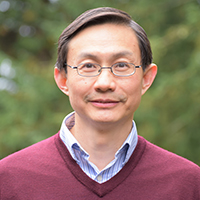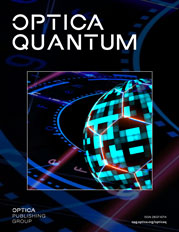Optica Publishing Group publishes high-quality, peer-reviewed articles in its portfolio of journals, which serve the full breadth of the optics and photonics community.
Optica Quantum is an online-only Gold Open Access journal dedicated to high-impact results in quantum information science and technology (QIST), as enabled by optics and photonics. Its scope encompasses theoretical and experimental research as well as technological advances in and applications of quantum optics. The Journal provides the same exceptional standards for quality, novelty, and significance as its parent journal, Optica.
Topics include:
- Quantum Computing and Simulation with Light
- Quantum Computing and Simulation with Atoms and Ions
- Quantum Computing and Simulation with Solid-State Systems
- Quantum Communication Systems
- Space-Based QIST
- Quantum Sensing and Metrology
- Platform-Independent Topics with Relevance to Optical QIST
- New Scientific Horizons in Optical QIST
- Hybrid Systems, Transduction, and Quantum Interconnects
- Quantum Photonic Sources and Detectors
- Integrated Optics and Nanophotonics in QIST
- Quantum Optical Materials
- Optical and Laser Technology for QIST Systems
- Societal, Educational, and Technological Challenges
Optica Quantum publishes bi-monthly (6 issues/year) and includes original research articles, reviews, invited perspectives, comments, and replies. Optica Quantum also offers the opportunity for authors and reviewers to participate in a transparent peer review process by agreeing to publish the peer review correspondence (decision letters, reviewer comments, and author response to reviews) associated with an article.
As a Gold Open Access journal, Optica Quantum has Article Processing Charges (APCs).
For more information, see the 14 April 2023 press release.
Sign up now to receive Table of Contents alerts when each issue of Optica Quantum is published.
Questions about Optica Quantum can be directed to the editorial staff at opticaquantum@optica.org.
Submission Information
Submissions should be prepared using the Optica Publishing Group universal manuscript templates for Word files and LaTeX. Optica Publishing Group's Author Style Guide provides additional formatting instructions. See the Author Resource Center for more instructions.
SubmitEditorial Review
A novelty and impact statement is required to explain the novelty, potential impact and relevance of the submission and clearly state why the paper is suitable for publication in Optica Quantum. The statement is not published with the paper but will aid the editors and reviewers in assessing a paper's novelty and significance by placing the work in the broader context of the existing literature and the authors' previous contributions. The statement and manuscript will generally be evaluated by two editorial board members—an associate editor in the manuscript's topic area as well as a deputy editor or the Editor-in-Chief—to determine if the paper will proceed to external peer review. When appropriate, the deputy editor or EiC will make the determination themselves. Perspectives will be evaluated in full at this stage and will be accepted or rejected on the basis of editorial review. Every effort will be made to complete this editorial review within 10 business days of submission. It is the editorial policy of Optica Quantum not to reveal the name of the associate editor at the editorial review stage.
If the editorial board declines the paper for Optica Quantum at the initial review stage but deems it appropriate for further consideration by Optica Publishing Group, the author will receive a decision letter that offers a limited-time option to transfer the manuscript to another Optica Publishing Group journal. See details below. Articles that pass the initial editorial review will be assigned to a member of the editorial board (associate editor) who will then conduct the standard peer review process and obtain external peer reviews.
Transfer Request
Submissions that are initially declined by Optica Quantum but that are deemed by the editors to merit consideration by other Optica Publishing Group journals, can be transferred, with the author's permission, to another journal and will carry the original submission date.
Details for activating the transfer request will be provided in the Optica Quantum decision letter, if applicable. The author will submit a request via Prism. The request should include the new Optica Publishing Group journal selection and a brief statement for the new Editor. The transfer option is available for three weeks after the decision letter from Optica Quantum.
The new Editor will approve or decline the transfer request. If approved, the paper will advance to the Resubmit Step at the new journal where a resubmission can be completed in adherence with any format/length requirements of the new journal. The original submission date will be retained. If the transfer is declined, any further resubmission will be considered a new manuscript with a new submission date.
Key Journal Metrics
Median Time to First Decision: 16 days
Median Time to Publication: 112 days
Editorial Board
 |
Editor-in-ChiefMichael G. Raymer |
Deputy Editors
 |
Sonja Franke-Arnold |
 |
Luis L. Sanchez-Soto |
 |
Kartik Srinivasan |
Associate Editors
 |
Thiago Alegre |
 |
Ulrik Andersen |
 |
Koji Azuma |
 |
Animesh Datta |
 |
Scott Diddams |
 |
Sara Ducci |
 |
Matthew Eichenfield |
 |
Julien Laurat |
 |
Christoph Marquardt |
 |
Zhe-Yu (Jeff) Ou |
 |
Marina Radulaski |
 |
Aephraim Steinberg |
 |
Alfred U'Ren |
 |
Nickolas Vamivakas |
 |
Hailin Wang |

